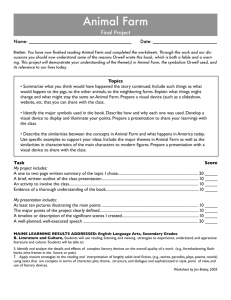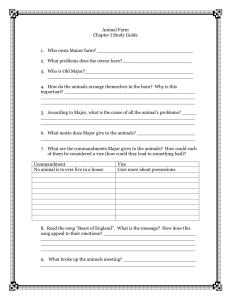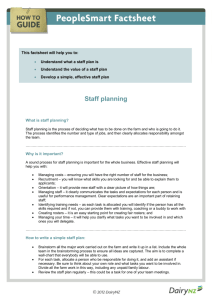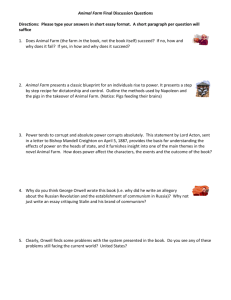Topic 15: Strategic Direction
advertisement
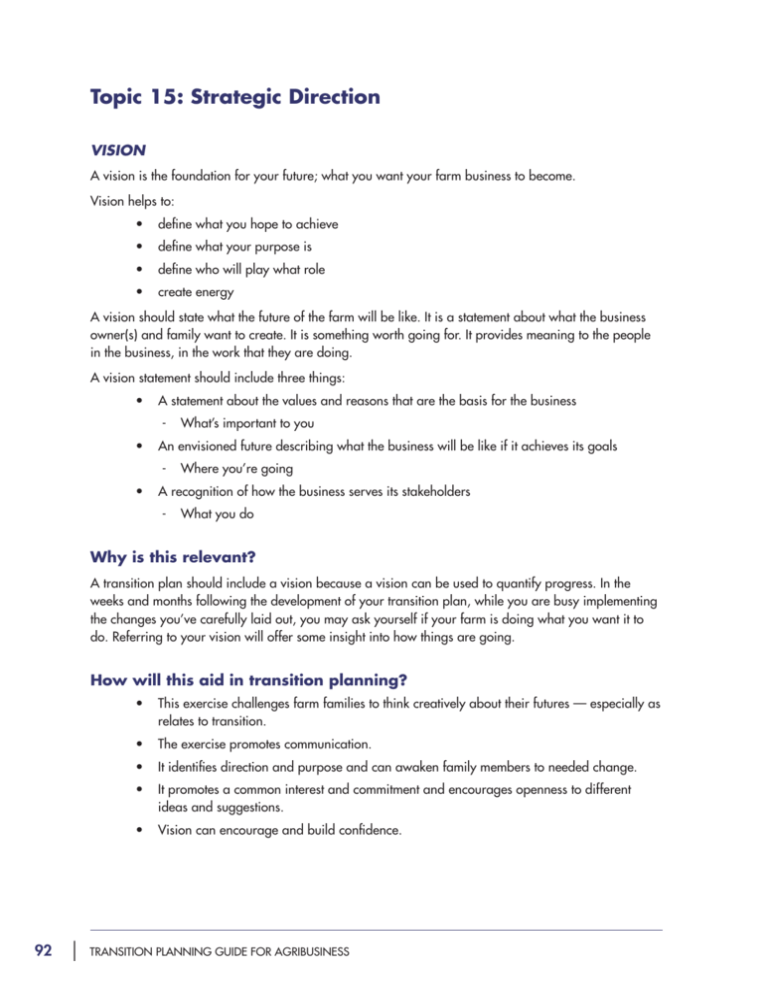
Topic 15: Strategic Direction VISION A vision is the foundation for your future; what you want your farm business to become. Vision helps to: • define what you hope to achieve • define what your purpose is • define who will play what role • create energy A vision should state what the future of the farm will be like. It is a statement about what the business owner(s) and family want to create. It is something worth going for. It provides meaning to the people in the business, in the work that they are doing. A vision statement should include three things: • A statement about the values and reasons that are the basis for the business - What’s important to you • An envisioned future describing what the business will be like if it achieves its goals - Where you’re going • A recognition of how the business serves its stakeholders - What you do Why is this relevant? A transition plan should include a vision because a vision can be used to quantify progress. In the weeks and months following the development of your transition plan, while you are busy implementing the changes you’ve carefully laid out, you may ask yourself if your farm is doing what you want it to do. Referring to your vision will offer some insight into how things are going. How will this aid in transition planning? • This exercise challenges farm families to think creatively about their futures — especially as relates to transition. • The exercise promotes communication. • It identifies direction and purpose and can awaken family members to needed change. • It promotes a common interest and commitment and encourages openness to different ideas and suggestions. • Vision can encourage and build confidence. 92 | Transition Planning Guide for Agribusiness Instructions 1. All family members actively involved in the farm should complete the exercise. 2. Non-farming family members can optionally participate in the exercise. 3. Review the goals exercise and values exercise that were completed earlier. Goals and values are closely tied to vision. 4.Each participating family member should write down their initial thoughts about their vision for the farm. The thoughts do not have to be in sentence or paragraph form. Single words or phrases are adequate. 5. Once everyone is ready, discuss what everybody has come up with. 6.Begin to bring these thoughts to a common statement. Use discussion to continue to crystallize the vision. 7. Set the exercise aside for a few days so people can think about what has been developed. 8. At a next discussion, review and edit the vision. Ideally, it should be summarized in a collection of two or three phrases. However, your vision statement can be two or three paragraphs. 9. Vision should be reviewed at least annually. 10.Store the documents for future reference. EXAMPLE Sample Farms Ltd. Vision Sample Farms Ltd. is a progressive grain farm that values the personal needs of our owners, managers, employees and their families. We strive to provide a work/life balance that motivates our people to achieve their highest performance. We operate with modern equipment and employ proven technologies. We are profitable and ready to take calculated risks that will not jeopardize our financial security. How does this apply? The goal is to have a statement that everyone agrees properly captures what they feel is the vision for the farm and family. What’s important is that you: • understand the importance and application of vision • start thinking about vision and create a first effort • understand that the vision will evolve over time Phase 2 – Plan Development | 93 Planning Pointers: • Your vision should be communicated internally and externally. Think about placing your vision statement on a plaque and putting it in a prominent place in your office or home. It should be reviewed at least annually. • If you and your family experience difficulty in creating a vision, imagine: - that you are sitting in a helicopter, hovering about 3,000 feet over your farm five years in the future: ~ What does the farm look like? How has it changed? ~ What’s happened in the industry and what have we done in response? ~ Who’s working there? What are they doing? ~ What business is being conducted? - that a neighbour drives by and looks at your farm five years in the future: ~ What is he seeing and thinking? - how the community views your business five years in the future? What to Watch For: • The vision that is going to be developed will not be perfect. Perfection is not the goal. • Consider using an external facilitator. Most families find it difficult to work through a vision exercise and successfully develop a well-worded statement that expresses what they think. EXERCISE: Go to the forms appendix at the back of this guide for a blank copy of the Vision exercise on page 261. Next steps Congratulations on completing this topic. You are now a step closer to having a transition plan for your farm. Please proceed to the next topic area on your Transition Plan, but don’t forget to add any assigned tasks that were generated by working through this topic. 94 | Transition Planning Guide for Agribusiness Vision What’s important to you? Where are you going? What do you do? ______________________________________________________________________________________ ______________________________________________________________________________________ ______________________________________________________________________________________ ______________________________________________________________________________________ ______________________________________________________________________________________ ______________________________________________________________________________________ ______________________________________________________________________________________ ______________________________________________________________________________________ ______________________________________________________________________________________ ______________________________________________________________________________________ ______________________________________________________________________________________ ______________________________________________________________________________________ ______________________________________________________________________________________ ______________________________________________________________________________________ Appendix | 261

